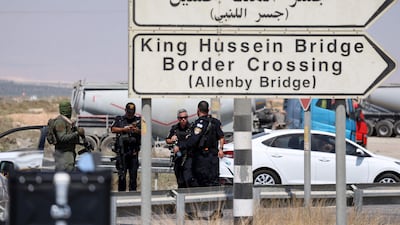Live updates: Follow the latest on Israel-Gaza
The Allenby Bridge between Jordan and the occupied West Bank reopened on Tuesday for passengers, but it remained closed for lorries, two days after a Jordanian lorry driver shot dead three Israeli workers at the crossing.
“There has been light passenger movement this morning,” a Jordanian official told The National.
Taxi drivers on the Jordanian side said the bridge closed at 3pm (12pm GMT), six hours before the official closing time. The bridge is known for its erratic opening hours.
It is the only direct border route between Jordan and the West Bank and serves as a vital passageway for Palestinians. Since attacks by Yemen's Houthi rebels disrupted Red Sea shipping this year, it has become a significant route for goods in and out of Israel.
Maher Al Jazi, a lorry driver from the southern governorate of Maan, was killed by Israeli security personnel at the bridge and the crossing was shut in both directions. The Jordanian Interior Ministry said on Monday that two Jordanian lorry drivers, apprehended by Israel in connection with the attack, remain in custody.
It is nearly 30 years since the 1994 peace treaty was signed between the two countries. It obligates Jordan and Israel to prevent cross-border threats.
The rare outbreak of violence at the tightly controlled border has put the kingdom in a delicate position. Since the start of the war in Gaza in October, widespread anger in Jordan over Israel’s conduct has increased, as well as accusations by supporters of militant groups that Jordanian authorities have not been doing enough to support Palestinians in the war.
The incident occurred despite extra measures taken by Jordan to secure the border with Israel since the war began in October, such as banning public assemblies near the frontier and a more expansive military presence.
In the first direct Jordanian official reaction to the Allenby attack, the Foreign Ministry issued a statement overnight condemning violence, while blaming Israel for what it described as the regional effect of the Gaza war.


